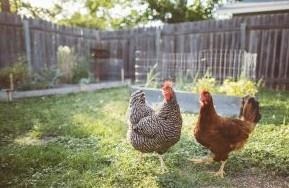More and more people are raising flocks of poultry in their urban backyards in Wisconsin and across the U.S. As the practice becomes legal in more areas and grows in popularity, experts recommend observing safe handling practices to avoid illness caused from poultry or eggs.
According to the Centers for Disease Control Prevention, 372 people were infected with Salmonella from backyard flocks in early 2017 alone, and more than one-third of those were children. Outbreaks of illness linked to backyard poultry have been reported across 47 states, and more are expected over the next several months.

Eggs
“Eggs are among the most nutritious foods on earth and can be part of a healthy diet,” says Barbara Ingham, food safety specialist with the University of Wisconsin-Extension. “However, they are perishable just like raw meat, poultry, and fish and even unbroken, clean, fresh shell eggs may contain harmful bacteria such as Salmonella.”
Scientists know that there are many ways bacteria can be introduced to eggs, such as through the laying process, contaminated poultry feed or bedding, or via baby chicks (pullets) that have been infected in a hatchery.
Fortunately, there are steps that you can take to help ensure safe, home-produced chicken eggs, says Ingham. She cites tested information from the fact sheet Egg Safety and the Backyard Flock written by Ingham and UW-Extension poultry specialist Ron Kean. The fact sheet is available online at https://foodsafety.wisc.edu/assets/pdf_Files/Egg_Safety_and_the_Backyard_Flock.pdf
Caring for the flock
A clean, well-maintained chicken shed will help to ensure safe eggs for your family. Ingham offers these tips.
- Maintain the flock in an enclosed shed to protect the flock from predators and make egg collecting easier.
- Keep the shed area clean and dry so eggs will stay cleaner. Thoroughly clean and disinfect the shed at least once a year with an approved disinfectant from your feed store. Apply according to directions.
- Allow one nest for every three to four chickens and make sure nests are large enough for your hens. To protect eggs, pad the nests with straw or wood chips. Clean out nest boxes once a week to remove dirty litter and manure and replace with clean nesting material.
- Allow adequate nest space and plenty of clean nesting material to help to ensure clean eggs and limit egg breakage.
- Provide a perch above the floor over a dropping box away from the nests. Chickens will roost on the perch to sleep and defecate into the wire-mesh covered dropping box. Do not let hens roost in the nest boxes.
- And to protect your family’s health, keep poultry feed and water dishes outside of the kitchen and away from household items.
Safe handling of eggs
- Always wash hands before, and after, handling chickens and eggs. Wash hands with warm soapy water before heading out to the chicken shed, and after handling raw eggs.
- Collect eggs often. Eggs that spend more time in the nest have an increased chance of becoming dirty, broken or generally lower in quality. Collect eggs daily, preferably before noon. Discard those with broken or cracked shells.
- Cleaning. Dirty eggs can be a health hazard. Gently clean visible dirt using a brush or fine sandpaper. Eggs should not be washed before storage, but if they are, use very warm water and a mild, non-foaming, unscented detergent approved for washing eggs, or dishwashing liquid that is free of scents and dyes. Rinse and gently dry.
- Storage. Store eggs in the main section of the refrigerator at 35°F to 40°F. If collected properly and refrigerated, eggs should have a shelf life of 6 to 8 weeks. Date the storage carton or container and use older eggs first.
- Preparation. Eggs are highly nutritious but should never be eaten raw or undercooked. To prevent illness, cook eggs until the yolks are firm and whites are set. Cook foods containing eggs thoroughly to 160°F. Do not keep cooked or raw eggs at room temperature for more than two hours.
Freezing
Frozen eggs do not maintain the quality of fresh eggs, but eggs can be frozen when hens are producing more than you can eat. Select fresh eggs for freezing. Break eggs out of their shells and beat until just blended, pour into freezer containers, seal tightly, label with the number of eggs and the date. Add a small amount of salt, sugar or corn syrup to prevent gelling and improve the keeping quality of the eggs. Whites and yolks may also be frozen separately.
If you choose to share eggs from your flock with friends and neighbors, use generic egg cartons that do not display a store or brand name and provide the date the eggs were collected. Be sure to always follow safety recommendations.
Source: uwex.edu